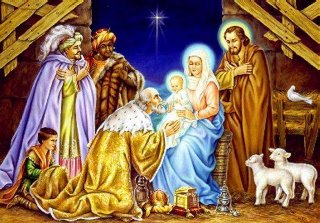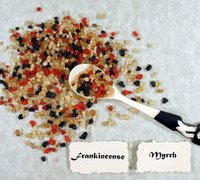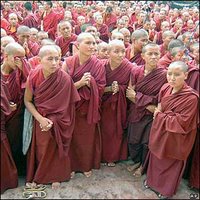In the Christian tradition of Christmas, we often see nativities that display Mary, Joseph (if you're lucky), some shepherds, baby Jesus in a manger (of course), angels, assorted barn animals and... wise men and the camels they rode in on. What's wrong with this picture?
 The wise men didn't show up until Jesus was living in a house (see Matthew 2:11). Of course, Mary and Joseph were only staying in the stable temporarily. It's to be assumed they'd want to move out and get back home as soon as possible. (IMHO there's something else wrong with this picture, but I'll discuss it at another time).
The wise men didn't show up until Jesus was living in a house (see Matthew 2:11). Of course, Mary and Joseph were only staying in the stable temporarily. It's to be assumed they'd want to move out and get back home as soon as possible. (IMHO there's something else wrong with this picture, but I'll discuss it at another time).Why were they in the stable?
Because there was a census taking place (see Luke 2) and all citizens were required to return to their birthplace during that census. Bethlehem was where Joseph was from and so naturally he took his pregnant fiance with him for the census because once you were engaged, you were seen to be as good as married. Since all the houses and inns were full, they ended up staying in the stables.
This was probably very common (though not much fun) for many of the travellers at that time. And because homes and inns were often structured around the animals, there wasn't much privacy. The animals were kept below, and some households lived in a level up from the animals, but exposed to the animals at all times.
Excavations have shown an arrangement where the house was made entirely out of mud and stone with a large pit in the middle of the house where the animals were kept. Then another level (up and out from the animal level) was where the family slept and cooked their meals. Picture it as shaped almost like a bowler hat, upside-down. It was often a convenient way to live because animals are warm in the winter and warm air rises. Often families slept on the rooftops in the summer.
So, Mary and Joseph were probably sleeping downstairs, but within sight of others who were staying upstairs. Not a lot of seclusion for an expecting mother.
There are four gospels in the Bible (Matthew, Mark, Luke and John) and each was written for a slightly different audience and by different authors, so each touches upon only what he thinks is important. Mark and John don't even feel that Jesus' childhood is significant, so there is no discussion of his birth.
The only mention of the wise men is in Matthew 2. Why is that?
The Book of Matthew was specifically targeted toward the Jews. The aim of the author was to tell the Jews that it was OK to believe that Christ was the Messiah predicted in the Old Testament. Since the Old Testament prophesies pointed to Jesus as being King of the Jews, it was very important to establish his lineage. How do you do that, if you're Matthew?
You discuss Joseph's ancestors, since the right to kingship is passed through the father's side. Mary also seemingly had a royal lineage, and it's possibly detailed in Luke (although there's debate about that).
You also discuss how important his birth was to everyone, and how it was heralded and even indicated by signs: "Now after Jesus was born in Bethlehem of Judea in the days of Herod the King, behold, magi from the east arrived in Jerusalem, saying "Where is He who has been born King of the Jews? For we saw His star in the east, and have come to worship Him." (Matt. 2:1-2)
 So who were these magi, where did they come from, and why did they bring "...gifts of gold and frankincense and myrrh"? Matthew doesn't give us a lot of details.
So who were these magi, where did they come from, and why did they bring "...gifts of gold and frankincense and myrrh"? Matthew doesn't give us a lot of details.We know they came from the east but we don't know how long they travelled to get to Jerusalem. So, they probably would have been of middle eastern or asian descent.
Frankincense and myrrh are both resins (dried tree sap) that come from trees of the genus Boswellia (frankincense) and Commiphora (myrhh), which are common to Somalia. But that doesn't necessarily indicate that any of them were from Africa (which was west of Jerusalem) since traders went everywhere. It also doesn't exclude any nationality, since people were known to travel far away from their birthplaces.
 They all were considered to be very wise and possibly practiced some form of magic (the word magi is the root for the word magician). There's no indication that they were kings, and so I would definately question the hymn "We Three Kings" (although I still love it).
They all were considered to be very wise and possibly practiced some form of magic (the word magi is the root for the word magician). There's no indication that they were kings, and so I would definately question the hymn "We Three Kings" (although I still love it).They probably would have studied together, and they must have taken their beliefs very seriously if they travelled so far to worship Jesus so it might even indicate a buddhist monastery. We simply don't know.
We know that some of their beliefs probably included astrology, since they took the star seriously. However, perhaps the star would have been taken seriously by anyone at the time but most people didn't guess what it indicated. We have no knowlege about it's appearance, so we can only surmise.
Additionally, we have no idea how many magi there were. They probably represented a community, and there may have been as little as 2 or they could have numbered in the hundreds. They certainly impressed Herod when they approached him, and it wasn't always easy to get an audience with him! In fact, Herod was impressed enough to kill every male (age 2 and under) in Bethlehem in order to eliminate the competition (Mary and Joseph had already whisked Jesus away to Egypt for a while).
Why the gifts of gold, frankincense and myrrh? I have been burning frankincense and myrrh daily, and it smells wonderful. But not only were they burned for fragrance, they were used in toiletries and oils. They were products that were very expensive, and they would have been considered a frivolity for anyone less than royalty. These were gifts that were fit for a King. And thus Matthew's case was made.

13 comments:
Kraut.
Happy christmas to you ande your family.
blog "Só Verdades" Portugal
Thank you.
David, Sua poesia é encantadora. Eu amo especial PENSAR NENHUM ANTES. Obrigado parando por meu blog mais cedo hoje. Feliz Natal!
See this is why I should have paid more attention when I used to be forced to go to Sunday School.
Anyway, it seems Matthews case was not made so well. Back when it was written, very few people bought it. It was not till many years later that Christianity took off. I believe that it was a Roman Emperor who converted to Christianity opening the door for it to become the dominate religion of western civilization. Charlemagne is the name that pops into my head. It was centuries after the gospels were written.
Anyway - all that is ancient history. The religion is 2000 years old and is not going anywhere anytime soon.
So Merry Christmas! I hope your gifts are better than some dried up tree sap!
I wonder what Matthew would have thought about maple syrup?
Sadly, I struggle a great deal with literal interpretations of the bible. Largely because the early church had their own mission (no pun intended) and seemed to rewrite history as it suited their needs. I am to the point where any details in the Bible are subject to scrutiny
I am glad to finally know what frankincense and myrrh are now *S*
Yes it's strange how popular culture gets Biblical facts wrong.
But I know this: I'm just glad that He came!
Everyone, I'm certainly not asking you to believe the literal translation of the Bible, though I believe probably 90% of it. This is merely the historical background and literal Biblical interpretation of the Christmas story (whether you practice this belief or another one). I'd also love to hear more about the history behind other religious holidays that I may not be so familiar with.
Mal, see above. But isn't it interesting about Frankincense and Myrrh? When I was little, I always wondered what they were and what they smelled like!
Lazy Iguana, you're largely correct about when Catholicism took off (under Charlemagne) but Christianity and Catholicism are not the same thing. Christianity started before Charlemagne, but (as you correctly pointed out) Charlemagne popularized it via Catholicism, which deviates markedly from other versions of Christianity.
Bryan, I think it's because most people have standard Sunday School education that didn't go past early childhood, so they were introduced to the simplified versions without ever getting any true knowlege out of it.
I found this very interesting and more for me that I do not dig deep enough in thought when I read my Bible!
Merry Christmas and a very very very Happy New Year to you and the Saurkid!
The main problem with the picture is IT'S FULL OF WHITE PEOPLE!!!
And we all know Christ was black...
Saur,
That Daniel is a trouble maker, please just ignor him. There's no mention of 7-Eleven's in the Bible.
Have a Merry Christmas. I hope Santa is good to you and your family.
Senor, Merry Christmas to you too, my friend, and I hope that Santa leaves you what you deserve. ;o)
Daniel, Well "swarthy" would be a better description. He was right in-between. Yeah, I never got the "blond" Marys. I always thought that was pretty funny. Happy Holidays!
Debbie, I'm glad you enjoyed it! Merry Christmas and Happy New Year to you and yours!
always thoughtful and thought provoking.
Merry Christmas to you and yours,
js
Merry Christmas Saur!
And yea, not all Christians are Catholic. But you have to hand it to ole Charlemagne, before him the entire religion was just not that popular. After the reign of Charlemagne, the small underground religion was the big dog of the west.
swarthy...i love that word. we all know that jesus was 8 lbs 6 oz's. so that should pretty much clear up any smack down.
Post a Comment